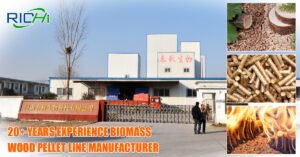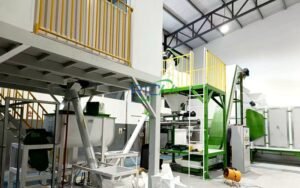
Alfalfa pelletizer have emerged as a game-changer in the agricultural sector, offering a sustainable solution for processing alfalfa and other biomass materials into high-quality pellets. This article delves into the intricate workings of alfalfa pelletizer, shedding light on their significance in modern agriculture.
Working Principle:
At the heart of alfalfa pellet mills lies the principle of compression. Raw alfalfa material is fed into the mill, where it undergoes intense pressure to form pellets. This compression process ensures uniformity in pellet size and density, resulting in consistent feed quality that meets the nutritional needs of livestock and other animals.
Benefits of Alfalfa Pellets:
Alfalfa pellets offer a myriad of benefits, ranging from enhanced nutrient availability to improved digestibility. These pellets are not only rich in essential nutrients but also boast excellent palatability, making them a preferred choice among farmers and feed producers. Moreover, their compact nature reduces waste and simplifies storage and transportation logistics.
Applications:
The versatility of alfalfa pellets extends across various sectors of the agricultural industry. They serve as a primary feed source for livestock such as cattle, sheep, and goats, providing essential nutrients for growth and development. Additionally, they play a crucial role in poultry farming, where they serve as a supplementary feed for chickens, turkeys, and ducks.
Furthermore, alfalfa pellets are highly sought after in horse feed formulations due to their high protein and fiber content. Beyond animal feed, these pellets find applications in biomass fuel production, contributing to the renewable energy sector’s growth.
Customization and Support:
Choosing the right supplier is paramount when investing in alfalfa pellet mills. Reputable suppliers offer customizable solutions tailored to the specific needs of customers’ pellet production lines. Furthermore, comprehensive support services, including installation assistance, operator training, and after-sales support, ensure a smooth and seamless experience for customers throughout the entire process.

Case Studies:
In the world of feed production, alfalfa pellet production lines play a crucial role in meeting the demands of the ever-growing agricultural industry. Let’s explore a few project cases ranging from 2 to 100 tons per hour and delve into the encountered challenges and their solutions, with a focus on RICHI Machinery’s turnkey project capacity.
Case Study 1: 10 Tons/Hour Alfalfa Pellet Production Line
Program Design Problems: One challenge encountered in the program design phase was optimizing the production process to ensure maximum efficiency and output. RICHI Machinery’s team of experts collaborated closely with the client to develop a customized program tailored to their specific needs, considering factors such as raw material availability, production capacity, and budget constraints.
Site Problems: Limited space at the client’s site posed a significant challenge during installation. RICHI Machinery’s engineers conducted a thorough site assessment and proposed a compact layout design to maximize space utilization while ensuring optimal workflow and safety.
Equipment Problems: During equipment installation, a technical issue arose with the pelletizing machine, causing disruptions to the production process. RICHI Machinery’s on-site technicians promptly diagnosed the problem and implemented necessary adjustments to restore the machine’s functionality, minimizing downtime and production losses.
Installation Problems: Coordinating the installation of various components of the production line posed logistical challenges. RICHI Machinery’s project management team efficiently coordinated the installation process, ensuring seamless integration of equipment and timely completion of the project.
After-sales Problems: Following the installation, the client faced difficulties in operating and maintaining the equipment effectively. RICHI Machinery provided comprehensive training sessions for the client’s staff, equipping them with the necessary skills and knowledge to operate and maintain the equipment efficiently.
Case Study 2: 50 Tons/Hour Alfalfa Pellet Production Line
Program Design Problems: Designing an efficient and scalable production process to accommodate the client’s high production demands was a primary concern. RICHI Machinery’s engineering team conducted detailed feasibility studies and simulations to optimize the program design, ensuring seamless operation and maximum productivity.
Site Problems: Environmental factors such as temperature and humidity fluctuations posed challenges to the production line’s performance. RICHI Machinery’s engineers implemented innovative solutions, such as climate control systems and insulation measures, to mitigate the impact of environmental variables on production efficiency.
Equipment Problems: Technical issues with the cooling and packaging systems resulted in product quality issues and production delays. RICHI Machinery’s technical support team promptly identified and rectified the equipment problems, implementing necessary adjustments to ensure consistent product quality and uninterrupted production.
Installation Problems: Complexities in equipment installation, including the integration of multiple components and systems, presented logistical challenges. RICHI Machinery’s experienced installation team meticulously planned and executed the installation process, ensuring proper alignment and functioning of all equipment components.
After-sales Problems: After commissioning the production line, the client encountered operational challenges due to staff turnover and inadequate training. RICHI Machinery provided ongoing support and training programs, empowering the client’s personnel with the skills and knowledge required to operate and maintain the equipment effectively.
In summary, navigating the complexities of alfalfa pellet production lines requires expertise, experience, and innovative solutions. With RICHI Machinery’s turnkey project capacity and commitment to customer satisfaction, clients can overcome challenges and achieve success in their feed production endeavors.
Conclusion:
In conclusion, alfalfa pelletizer represent a transformative technology that has revolutionized the agricultural industry. By investing in high-quality equipment and partnering with experienced suppliers, farmers and feed producers can unlock numerous benefits, including enhanced feed quality, reduced costs, and increased profitability. Embracing the potential of alfalfa pellet mills is not just a choice; it’s a necessity for those looking to stay ahead in today’s competitive agricultural landscape.




